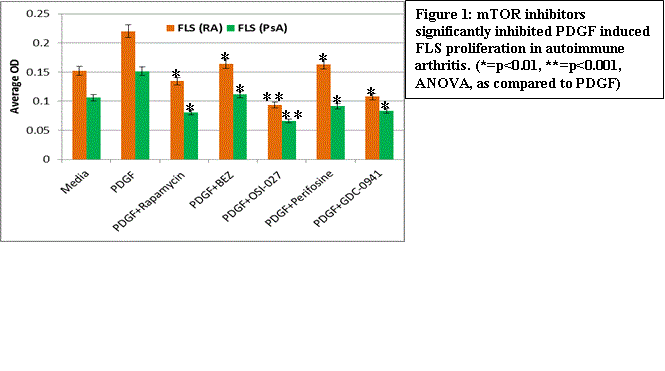Session Information
Session Type: Abstract Submissions (ACR)
Background/Purpose: The PI3K/Akt/mTOR signaling proteins are pro-growth/pro-survival and thus likely to regulate inflammatory cascades in autoimmune diseases (1). The key pathologic outcome in psoriatic arthritis (PsA) and rheumatoid arthritis (RA) is ‘uncontrolled proliferation’ of synovial fibroblasts (FLS), endothelial cells (EC) and T cells. To identify the regulatory role of the PI3K/Akt/mTOR kinase cascade in FLS proliferation, immune response and neoangiogenesis in PsA and RA here we investigated the functional role of this kinase cascade in the target pathologic cells (FLS, EC, T cells) of these diseases.
Methods: Using the MTT assay we compared the antimitotic effect of Perifosine (Akt inhibitor), GDC-0941 (PI3K inhibitor), Rapamycin, NVP-BEZ235 (PI3K & mTOR inhibitor) and OSI-027 (mTORC1 & mTORC2 inhibitor) on FLS, T cells and human umbilical vein endothelial cells (HUVEC). FLS were derived from synovial tissues and T cells were obtained from the PBMC of PsA (n=5) and RA (n=5) patients. FLS were treated with PDGF and the T cells were activated with anti-CD3/CD28 cocktail. RTPCR was done to determine the effects of these mTOR inhibitors on regulation of genes associated with proliferation (MKI67), inflammation (IL-8, MMP3) and T cell activation (IFNG and IL2).
Results: All the inhibitors significantly inhibited PDGF induced FLS proliferation in RA and PsA (Figure 1). The dual mTOR inhibitor OSI-027 had a maximum inhibitory effect. In HUVEC and T cells the maximal inhibitory effect was noticed with PI3K inhibitor GDC-094. RTPCR results showed marked inhibition of the proliferation marker MKI67 mRNA in all the cell lines, inhibition of MMP3 gene expression in FLS and inhibition of IFNG and IL2 genes in T cells.
Conclusion: Dual inhibitor of mTORC1/mTORC2 and proximal kinase inhibitors (Akt or PI3K) have more potent antimitotic effect on FLS, HUVECs and T cells compared to Rapamycin. These observations open up a new paradigm in respect to the regulatory role of mTOR kinase cascade in inflammatory arthritis and provide novel targets for these diseases. Inhibition of mTORC1 by rapamycin results in an unopposed activation of mTORC2 and thus induces a positive feedback to the PI3K/Akt pathway and reduces its clinical efficacy. To overcome the therapeutic failure of rapamycin (mTORC1 inhibitors) here we have explored whether an alternative effective therapeutic approach could be a dual inhibition of mTORC1 and mTORC2 or more proximal inhibition of the mTOR cascade by targeting either Akt or PI3K .
Reference:
1. Raychaudhuri SK, Raychaudhuri SP. mTOR Signaling Cascade in Psoriatic Disease: Double Kinase mTOR Inhibitor a Novel Therapeutic Target. Indian J Dermatol 2014;59:67-70.
Disclosure:
S. Raychaudhuri,
None;
A. Mitra,
None;
A. Datta Mitra,
None;
C. Abria,
None;
S. K. Raychaudhuri,
None.
« Back to 2014 ACR/ARHP Annual Meeting
ACR Meeting Abstracts - https://acrabstracts.org/abstract/hierarchical-role-of-pi3kaktmtor-signaling-cascade-on-tissue-inflammation-organization-and-angiogenesis-in-autoimmune-arthritis/

